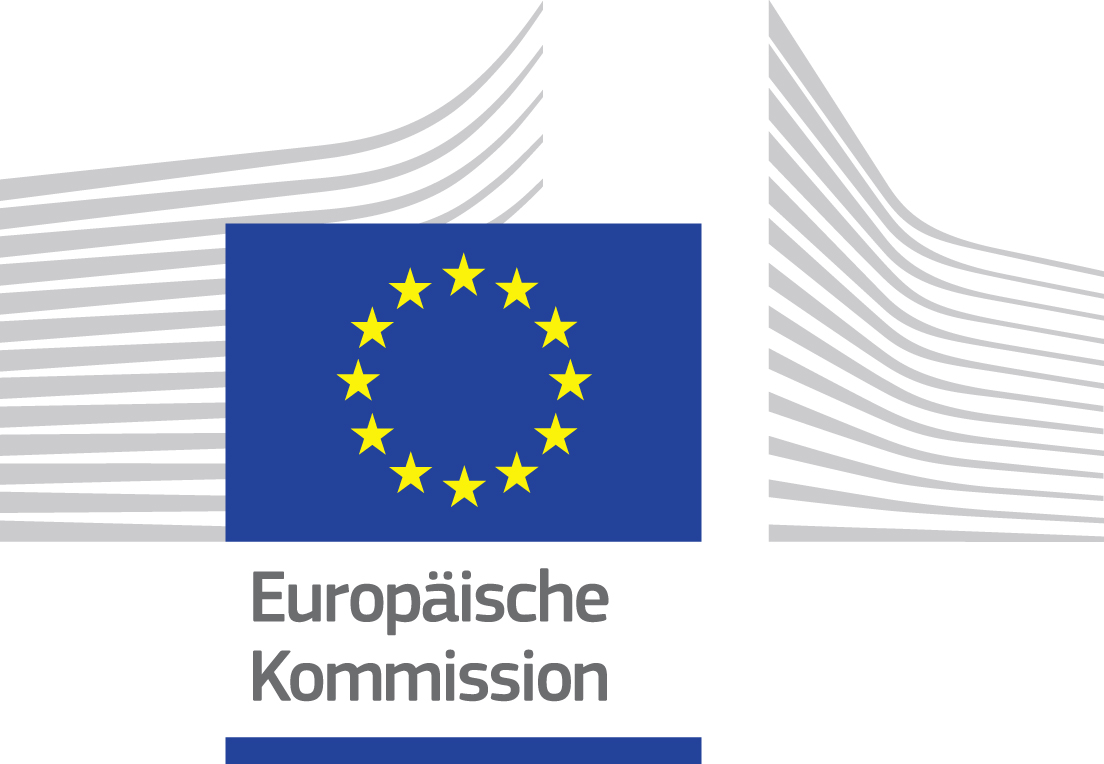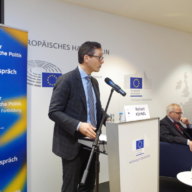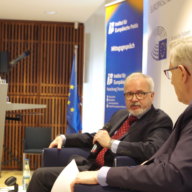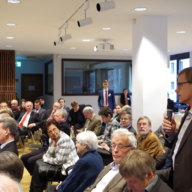Public Debate with Dr. Werner Hoyer, President of the EIB on 19 January 2018
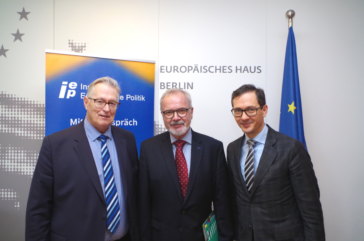
On the 19 January 2018 our Public Debate with Dr. Werner Hoyer, President of the European Investment Bank, on the topic “Role and Perspectives of the European Investment Bank as a Catalyst for Economic Growth in the EU”, took place in the European House in Berlin. The introductory remarks were given by Richard Kühnel, Head of the Representation of the European Commission in Germany. Prof. Dr. Mathias Jopp, Director of the Institute for European Politics (IEP), moderated the event.
In his opening words, Mr. Kühnel remembered one of our co-founders, Arno Krause, who had passed away shortly before. Mr. Kühnel remembered Arno Krause as an inspiring role model in the process of shaping Europe, who has, owing to his relentless dedication, coined our institute from the beginning. Mr. Kühnel expressed great gratitude, before giving the floor to Mr. Jopp, who welcomed Mr. Hoyer and all attendant guests to the event before giving a brief introduction to the topic.
Mr. Hoyer started out by emphasizing the significance of the EIB as “the last undetected treasure in the history of integration” by referring to the mission of the bank – the collaborative economic development and the offset between the states – which is still relevant today, 60 years after its foundation. Hoyer then went through the EIB’s history, commencing with the Treaties of Rome, major challenges during the times of financial crisis, before finishing up with the annual Final Conference 2017, which took place in Luxembourg one day before. It was especially important for Mr. Hoyer to highlight one concern regarding the self-conception of the bank. He underlined that the EIB acts as a development bank for national economies, rather than for states exclusively. It provides funding for projects in the EUs’ interest, Hoyer continued, but is also dependent on the support of private banks, especially in the context of creating incentives for private investments.
The banks’ role as Crowding-In-Bank that attracts private capital, close relationships with national states, EU institutions and national banks, is, in Mr. Hoyer’s opinion, crucial for the long-term success of the EU bank.
Today’s narrative of the European integration, is the “the Europeans’ ability to assert themselves in the globalization”. He reasoned that, in order to be well-prepared for the great challenges of a globalized world economy, the focus on three goals is substantial:
1) Closer cooperation with the member states, institutions and private banks, which should strengthen the cohesion within the Union and approach structural weaknesses. National solo-efforts are an “illusion”, Hoyer reasoned, and pursuing them is not sustainable. Respectively, Hoyer called the “Brexit” a “great nuisance”, as Great Britain’s share of the EIB’s capital is as high as 16 percent, and as the Brits have always been reliable partners. As a result of Great Britain leaving the Union, many long term projects could be jeopardized, due to about 100 billion Euros lending volume that will have to be cut over the next years. Hoyer deplored these developments which are tangible for the EIB.
2) Development cooperation. The EIB operates outside of the EU and reinforces its efforts on other continents. Mr. Hoyer suggested that the cooperation with partners on other continents is a crucial factor, as small investment can have a serious impact, when using modern technology and digitalization. If chances are taken, whilst relying on the advantages of Crowding-In and cooperation, a “quantum leap” could be possible in near future, especially with regard to the sustainable development goals, proclaimed by the UN.
3) Lastly, Mr. Hoyer mentioned climate financing. The EIB dedicated itself to the climate goals formulated in the Treaty of Paris, Hoyer elaborated, and was the Avantgarde behind the MDBs. Additionally, the EIB acts as the world’s largest emitter of environmental bonds, so-called, climate awareness bonds, a market that currently booms. All the sectors mentioned above, constitute great chances for the Europeans, particularly as Europes’ economic development is currently flourishing. Hoyer then concluded with an plea for strengthening the Europeans within the globalized economy: “To be courageous, to create new instruments and to keep the common goals in view!”.
During the following lively discussion with the audience, questions especially addressed the EIB’s role as a development bank and its relationship with representatives of the economic sectors and unions, as well as the impact of Brexit on the EIB’s loan volume. Hoyer conceded that there are still many uncertainties that need clarification. However, new contracts with the UK are needed in order to create legal certainty and to solve financial issues. Mr. Hoyer assured the guests that the EIB was well-consolidated and would not lose its AAA-rating. However, being a committed European, Hoyer managed to find one advantage coming out of the Brexit: never before did he experience “the European citizens being as united and clear”.
